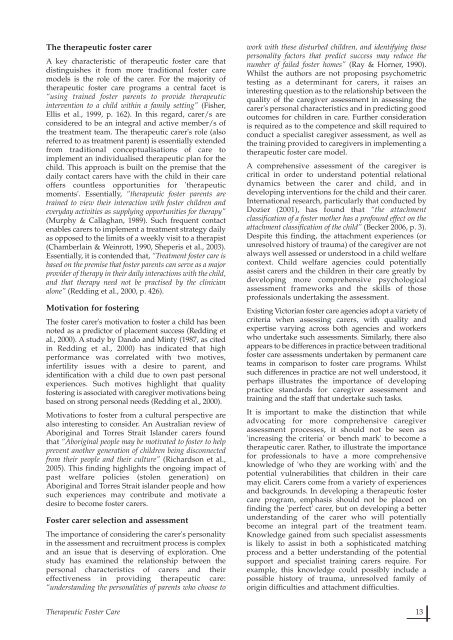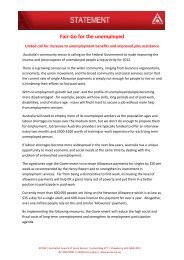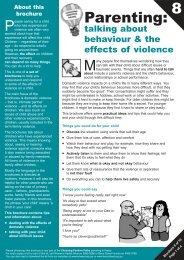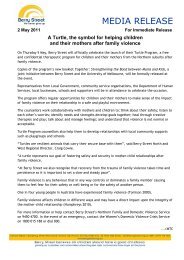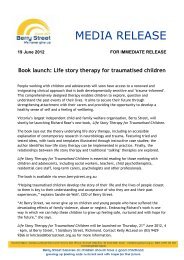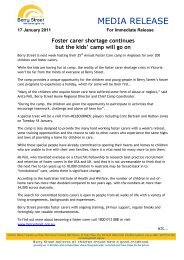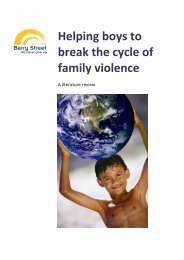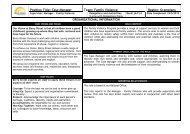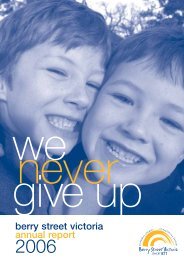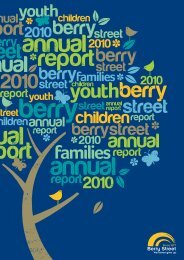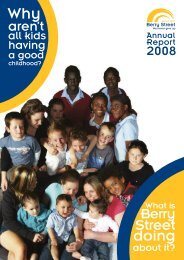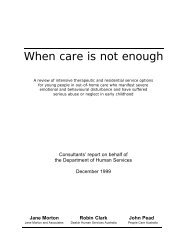Therapeutic foster care - Berry Street Childhood Institute
Therapeutic foster care - Berry Street Childhood Institute
Therapeutic foster care - Berry Street Childhood Institute
You also want an ePaper? Increase the reach of your titles
YUMPU automatically turns print PDFs into web optimized ePapers that Google loves.
The therapeutic <strong>foster</strong> <strong>care</strong>r<br />
A key characteristic of therapeutic <strong>foster</strong> <strong>care</strong> that<br />
distinguishes it from more traditional <strong>foster</strong> <strong>care</strong><br />
models is the role of the <strong>care</strong>r. For the majority of<br />
therapeutic <strong>foster</strong> <strong>care</strong> programs a central facet is<br />
“using trained <strong>foster</strong> parents to provide therapeutic<br />
intervention to a child within a family setting” (Fisher,<br />
Ellis et al., 1999, p. 162). In this regard, <strong>care</strong>r/s are<br />
considered to be an integral and active member/s of<br />
the treatment team. The therapeutic <strong>care</strong>r's role (also<br />
referred to as treatment parent) is essentially extended<br />
from traditional conceptualisations of <strong>care</strong> to<br />
implement an individualised therapeutic plan for the<br />
child. This approach is built on the premise that the<br />
daily contact <strong>care</strong>rs have with the child in their <strong>care</strong><br />
offers countless opportunities for 'therapeutic<br />
moments'. Essentially, “therapeutic <strong>foster</strong> parents are<br />
trained to view their interaction with <strong>foster</strong> children and<br />
everyday activities as supplying opportunities for therapy”<br />
(Murphy & Callaghan, 1989). Such frequent contact<br />
enables <strong>care</strong>rs to implement a treatment strategy daily<br />
as opposed to the limits of a weekly visit to a therapist<br />
(Chamberlain & Weinrott, 1990, Sheperis et al., 2003).<br />
Essentially, it is contended that, “Treatment <strong>foster</strong> <strong>care</strong> is<br />
based on the premise that <strong>foster</strong> parents can serve as a major<br />
provider of therapy in their daily interactions with the child,<br />
and that therapy need not be practised by the clinician<br />
alone” (Redding et al., 2000, p. 426).<br />
Motivation for <strong>foster</strong>ing<br />
The <strong>foster</strong> <strong>care</strong>r's motivation to <strong>foster</strong> a child has been<br />
noted as a predictor of placement success (Redding et<br />
al., 2000). A study by Dando and Minty (1987, as cited<br />
in Redding et al., 2000) has indicated that high<br />
performance was correlated with two motives,<br />
infertility issues with a desire to parent, and<br />
identification with a child due to own past personal<br />
experiences. Such motives highlight that quality<br />
<strong>foster</strong>ing is associated with <strong>care</strong>giver motivations being<br />
based on strong personal needs (Redding et al., 2000).<br />
Motivations to <strong>foster</strong> from a cultural perspective are<br />
also interesting to consider. An Australian review of<br />
Aboriginal and Torres Strait Islander <strong>care</strong>rs found<br />
that “Aboriginal people may be motivated to <strong>foster</strong> to help<br />
prevent another generation of children being disconnected<br />
from their people and their culture” (Richardson et al.,<br />
2005). This finding highlights the ongoing impact of<br />
past welfare policies (stolen generation) on<br />
Aboriginal and Torres Strait islander people and how<br />
such experiences may contribute and motivate a<br />
desire to become <strong>foster</strong> <strong>care</strong>rs.<br />
Foster <strong>care</strong>r selection and assessment<br />
The importance of considering the <strong>care</strong>r's personality<br />
in the assessment and recruitment process is complex<br />
and an issue that is deserving of exploration. One<br />
study has examined the relationship between the<br />
personal characteristics of <strong>care</strong>rs and their<br />
effectiveness in providing therapeutic <strong>care</strong>:<br />
“understanding the personalities of parents who choose to<br />
work with these disturbed children, and identifying those<br />
personality factors that predict success may reduce the<br />
number of failed <strong>foster</strong> homes” (Ray & Horner, 1990).<br />
Whilst the authors are not proposing psychometric<br />
testing as a determinant for <strong>care</strong>rs, it raises an<br />
interesting question as to the relationship between the<br />
quality of the <strong>care</strong>giver assessment in assessing the<br />
<strong>care</strong>r's personal characteristics and in predicting good<br />
outcomes for children in <strong>care</strong>. Further consideration<br />
is required as to the competence and skill required to<br />
conduct a specialist <strong>care</strong>giver assessment, as well as<br />
the training provided to <strong>care</strong>givers in implementing a<br />
therapeutic <strong>foster</strong> <strong>care</strong> model.<br />
A comprehensive assessment of the <strong>care</strong>giver is<br />
critical in order to understand potential relational<br />
dynamics between the <strong>care</strong>r and child, and in<br />
developing interventions for the child and their <strong>care</strong>r.<br />
International research, particularly that conducted by<br />
Dozier (2001), has found that “the attachment<br />
classification of a <strong>foster</strong> mother has a profound effect on the<br />
attachment classification of the child” (Becker 2006, p. 3).<br />
Despite this finding, the attachment experiences (or<br />
unresolved history of trauma) of the <strong>care</strong>giver are not<br />
always well assessed or understood in a child welfare<br />
context. Child welfare agencies could potentially<br />
assist <strong>care</strong>rs and the children in their <strong>care</strong> greatly by<br />
developing more comprehensive psychological<br />
assessment frameworks and the skills of those<br />
professionals undertaking the assessment.<br />
Existing Victorian <strong>foster</strong> <strong>care</strong> agencies adopt a variety of<br />
criteria when assessing <strong>care</strong>rs, with quality and<br />
expertise varying across both agencies and workers<br />
who undertake such assessments. Similarly, there also<br />
appears to be differences in practice between traditional<br />
<strong>foster</strong> <strong>care</strong> assessments undertaken by permanent <strong>care</strong><br />
teams in comparison to <strong>foster</strong> <strong>care</strong> programs. Whilst<br />
such differences in practice are not well understood, it<br />
perhaps illustrates the importance of developing<br />
practice standards for <strong>care</strong>giver assessment and<br />
training and the staff that undertake such tasks.<br />
It is important to make the distinction that while<br />
advocating for more comprehensive <strong>care</strong>giver<br />
assessment processes, it should not be seen as<br />
'increasing the criteria' or 'bench mark' to become a<br />
therapeutic <strong>care</strong>r. Rather, to illustrate the importance<br />
for professionals to have a more comprehensive<br />
knowledge of 'who they are working with' and the<br />
potential vulnerabilities that children in their <strong>care</strong><br />
may elicit. Carers come from a variety of experiences<br />
and backgrounds. In developing a therapeutic <strong>foster</strong><br />
<strong>care</strong> program, emphasis should not be placed on<br />
finding the 'perfect' <strong>care</strong>r, but on developing a better<br />
understanding of the <strong>care</strong>r who will potentially<br />
become an integral part of the treatment team.<br />
Knowledge gained from such specialist assessments<br />
is likely to assist in both a sophisticated matching<br />
process and a better understanding of the potential<br />
support and specialist training <strong>care</strong>rs require. For<br />
example, this knowledge could possibly include a<br />
possible history of trauma, unresolved family of<br />
origin difficulties and attachment difficulties.<br />
<strong>Therapeutic</strong> Foster Care 13


